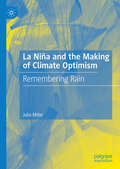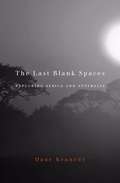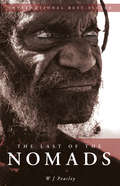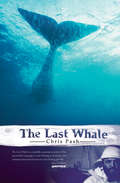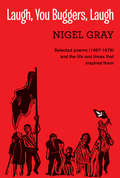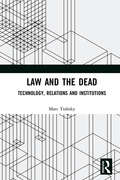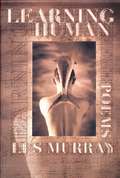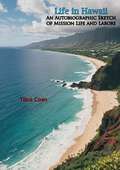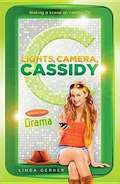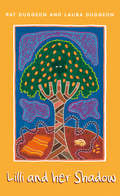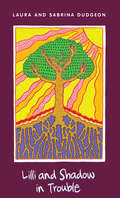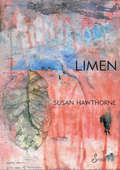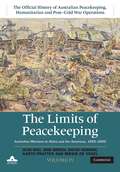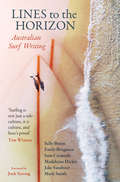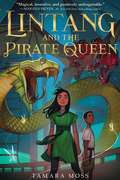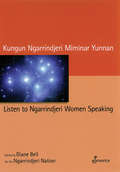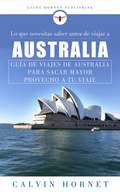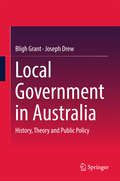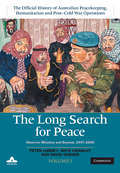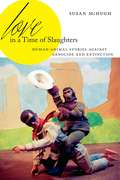- Table View
- List View
La Niña and the Making of Climate Optimism: Remembering Rain
by Julia MillerThis book examines the deep connection Australians have with their climate to understand contemporary views on human-induced climate change. It is the first study of the Australian relationship with La Niña and it explains how fundamental this relationship is to the climate change debate both locally and globally. While unease with the Australian environment was a hallmark of early settler relations with a new continent, this book argues that the climate itself quickly became a source of hope and linked to progress. Once observed, weather patterns coalesced into recognizable cycles of wet and dry years and Australians adopted a belief in the certainty of good seasons. It was this optimistic response to climate linked to La Niña that laid the groundwork for this relationship with the Australian environment. This book will appeal to scholars and students of the environmental humanities, history and science as well as anyone concerned about climate change.
Labor'S Conflict
by Tom Bramble Rick KuhnOnce widely regarded as the workers greatest hope for a better world, the ALP today would rather project itself as a responsible manager of Australian capitalism. Labor's Conflict provides an insightful account of the transformations in the Party's policies, performance and structures since its formation. Seasoned political analysts, Tom Bramble and Rick Kuhn offer an incisive appraisal of the Party's successes and failures, betrayals and electoral triumphs in terms of its competing ties with bosses and workers. The early chapters outline diverse approaches to understanding the nature of the Party and then assess the ALP's evolution in response to major social upheavals and events, from the strikes of the 1890s, through two World Wars, the Great Depression, and the post-war boom. The records of the Whitlam, Hawke, Keating, Rudd and Gillard governments are then dissected in detail. The compelling conclusion offers alternatives to the Australian Labor Party, for those interested in progressive change.
Language Contact in the Early Colonial Pacific
by Emanuel J. DrechselThis volume presents a historical-sociolinguistic description and analysis of Maritime Polynesian Pidgin. It offers linguistic and sociohistorical substantiation for a regional Eastern Polynesian-based pidgin, and challenges conventional Eurocentric assumptions about early colonial contact in the eastern Pacific by arguing that Maritime Polynesian Pidgin preceded the introduction of Pidgin English by as much as a century. Emanuel J. Drechsel not only opens up new methodological avenues for historical-sociolinguistic research in Oceania by a combination of philology and ethnohistory, but also gives greater recognition to Pacific Islanders in early contact between cultures. Students and researchers working on language contact, language typology, historical linguistics and sociolinguistics will want to read this book. It redefines our understanding of how Europeans and Americans interacted with Pacific Islanders in eastern Polynesia during early encounters and offers an alternative model of language contact.
The Last Battle
by Bruce Scates Melanie OppenheimerWhen Australian soldiers returned from the First World War they were offered the chance to settle on 'land fit for heroes'. Promotional material painted a picture of prosperous farms and contented families, appealing to returned servicepeople and their families hoping for a fresh start. Yet just 20 years after the inception of these soldier settlement schemes, fewer than half of the settlers remained on their properties. In this timely book, based on recently uncovered archives, Bruce Scates and Melanie Oppenheimer map out a deeply personal history of the soldiers' struggle to transition from Anzac to farmer and provider. At its foundation lie thousands of individual life stories shaped by imperfect repatriation policies. The Last Battle examines the environmental challenges, the difficulties presented by the physical and psychological damage many soldiers had sustained during the war, and the vital roles of women and children.
The Last Blank Spaces
by Dane KennedyThe challenge of opening Africa and Australia to British imperial influence fell to a coterie of proto-professional explorers who sought knowledge, adventure, and fame but often experienced confusion, fear, and failure. The Last Blank Spaces follows the arc of these explorations, from idea to practice, intention to outcome, myth to reality.
Last of the Nomads
by W J Peaseley'Peasley's description of the events … is informative, compassionate, exciting and at times deeply moving.' —Don Grant, Australian Book Review 'The intriguing story of [the rescue of an elderly couple believed to be the last Australian nomads] and how they survived alone for the previous 30 years or so in the unrelenting western Gibson Desert region of WA, is fascinating reading.' — Chris Walters, The West Australian 'This is a most remarkable book about the recovery during the 1977 drought of an ailing Aboriginal nomadic couple, living in desert regions of Western Australia.' — The National Times Warri and Yatungka were believed to be the last of the Mandildjara tribe of desert nomads to live permanently in the traditional way. Their deaths in the late 1970s marked the end of a tribal lifestyle that stretched back more than 30,000 years. The Last of the Nomads tells of an extraordinary journey in search of Warri and Yatungka.
The Last Whale
by Chris PashAt the end of the 1970s, one young reporter bears witness to the final days of Australia’s whaling industry. Thirty years after the last whale was captured and slaughtered in Australia, this incisive account tells the very human story of the characters and events that brought whaling to an end. This fair and balanced account portrays the raw adventure of going to sea, the perils of being a whaler, and the commitment that leads activists to throw themselves into the path of an explosive harpoon. Accompanied by a wonderful photographic record of the time, this is the action-packed history of a town reliant on whaling dollars pitted against a determined band of protesters.
Laugh, You Buggers, Laugh: Selected poems (1967-1979) and the life and times that inspired them
by Nigel GrayLaugh, You Buggers, Laugh is no ordinary collection of poems. Nigel Gray led an extraordinary life in extraordinary times. He was a political activist and performance poet in the UK during the days of rage and hope, flower power and free love, radical social change and political upheaval that typified the 1960s and 70s. He travelled on political forays to Southeast Asia, Africa, Ireland, and mainland Europe. This is a selection of poems from that time set in a context that explains the situations and experiences that inspired them. Nigel Gray, an Irish-born West Australian, is the multi-award-winning author of a hundred published books for adults and children.
Law and the Dead: Technology, Relations and Institutions
by Marc TrabskyThe governance of the dead in the eighteenth and nineteenth centuries gave rise to a new arrangement of thanato-politics in the West. Legal, medical and bureaucratic institutions developed innovative technologies for managing the dead, maximising their efficacy and exploiting their vitality. Law and the Dead writes a history of their institutional life in the nineteenth and twentieth centuries. With a particular focus on the technologies of the death investigation process, including place-making, the forensic gaze, bureaucratic manuals, record-keeping and radiography, this book examines how the dead came to be incorporated into legal institutions in the modern era. Drawing on the writings of philosophers, historians and legal theorists, it offers tools for thinking through how the dead dwell in law, how their lives persist through the conduct of office, and how coroners assume responsibility for taking care of the dead. This historical and interdisciplinary book offers a provocative challenge to conventional thinking about the sequestration of the dead in the nineteenth and twentieth centuries. It asks the reader to think through and with legal institutions when writing a history of the dead, and to trace the important role assumed by coroners in the governance of the dead. This book will be of interest to scholars working in law, history, sociology and criminology.
Learning Human
by Les MurrayA bighearted selection from the inimitable Australian poet's diverse ten-book body of work Les Murray is one of the great poets of the English language, past, present, and future. Learning Human contains the poems he considers his best: 137 poems written since 1965, presented here in roughly chronological order, and including a dozen poems published for the first time in this book. Murray has distinguished between what he calls the "Narrowspeak" of ordinary affairs, of money and social position, of interest and calculation, and the "Wholespeak" of life in its fullness, of real religion, and of poetry. Poetry, he proposes, is the most human of activities, partaking of reason, the dream, and the dance all at once -- "the whole simultaneous gamut of reasoning, envisioning, feeling, and vibrating we go through when we are really taken up with some matter, and out of which we may act on it. We are not just thinking about whatever it may be, but savouring it and experiencing it and wrestling with it in the ghostly sympathy of our muscles. We are alive at full stretch towards it." He explains: "Poetry models the fullness of life, and also gives its objects presence. Like prayer, it pulls all the motions of our life and being into a concentrated true attentiveness to which God might speak." The poems gathered here give us a poet who is altogether alive and at full stretch toward experience. Learning Human, an ideal introduction to Les Murray's poetry, suggests the variety, the intensity, and the generosity of this great poet's work so far.
Life in Hawaii: An Autobiographic Sketch of Mission Life and Labors
by Titus CoanBorn in Connecticut and educated at East Guilford Academy, Coan went to western New York, where he was converted in a Charles G. Finney revival. After graduation from Auburn Theological Seminary and ordination in 1833, he explored the Argentine region of Patagonia on behalf of the American Board of Commissioners for Foreign Missions (ABCFM). In 1834 he married Fidelia Church, sailed for Hawaii, and was stationed at Hilo. He made an extended evangelistic tour of the island in 1836, which produced dramatic results. In 1837 and 1838, thousands flocked to Hilo for days and nights of fervent preaching, prayer, and manifestations of the power of the Spirit. Prior to 1837, prospective church members were rigorously examined and less than 1,200 had been admitted. After that year admissions averaged nearly 2,000 annually. By 1853, in a native population of about 71,000, over 56,000 were Protestants. The ABCFM moved to declare Hawaii Christianized and terminate the mission. Coan advocated a mission by Hawaiians to the Marquesas Islands and made two voyages there as a delegate of the Hawaiian Missionary Society. In 1873 he married Lydia Bingham, daughter of Hiram and Sybil Bingham, his first wife having died in 1872. He wrote Adventures in Patagonia (1880) and Life in Hawaii (1882). He died in Hawaii.- David M. Stowe, “Coan, Titus,” in Biographical Dictionary of Christian Missions, ed. Gerald H. Anderson (New York: Macmillan Reference USA, 1998), 139.
Lights, Camera, Cassidy: Drama
by Linda GerberCassidy Barnett is not your average twelve- (almost thirteen!-) year -old. While most other girls her age are worries about school and clothes and boys, Cass has spent most of her life traveling the world with her travel TV-show-host parents. She gets to visit fabulous places and loves connecting with people via her popular blog. But when the producers of the show decide that they want to feature Cass on camera, all of that starts to change. Now she's got to think about what she says, how she looks, and what the world is saying about her. Because like it or not, it's LIGHTS, CAMERA, CASSIDY! G'day, mates! In this fourth episode, Cassidy and the crew of When in Rome get a hearty dose of Australian hospitality when they head to Melbourne to film. But while Cass is starting to get used to her celebrity status, she's not sure she likes it when she realizes that most of the fans seem more interested in Logan than in her. At the same time, there seem to be a lot of technical glitches interfering with filming. What's going on? And can Cass get over her jealousy and help figure it out before it's too late?
Lilli and Her Shadow
by Pat Dudgeon Laura DudgeonLilli’s family is moving from the outback to the city, and Lilli is sure she'll be horribly lonely. She'll miss the mangoes, she'll miss her cousins, and most of all, she'll miss her Grandma. But when Grandma sends a special friend south with her granddaughter—a secret Shadow to look after her—Lilli discovers life in the city isn't so bad after all.
Lilli and Shadow in Trouble
by Laura Dudgeon Sabrina DudgeonThis is the second book to follow the adventures of Lilli—a young girl who has moved from the Australian bush to the city—and her magical animal friend, Shadow. While on holiday visiting family in the bush, Lilli discovers that Shadow is fading. Someone, or something, has taken over Shadow’s home in the old mango tree and Shadow is scared. With Lilli’s help, and with some assistance from Nan, they find the best solution for everyone, including the mango tree creature. Inspired by the art of Aboriginal storytelling, this charming read is sure to entertain junior readers.
Limen
by Susan HawthorneWhen two women and a dog set off on a holiday, they have no inkling of what's to come. They wake to find the river has crept up silently during the night. Trapped by floodwater, they devise escape routes only to be faced with more obstacles at every turn. Only the dog remains calm. This poetic novella grips you with its language, its pace, and its anxieties. The word limen is defined as "a threshold below which a stimulus is not perceived." In Susan's Hawthorne's verse novel, there is the threat of the rising waters--the women's safety is above the threshold of perception. This definition feeds the suspense and tension of this book. However, the word also suggests a transition, a state, a threshold between earth and sky, between day and night, between water and heat, survival and drowning--and it is these paired states, together with many more that also drive narrative.
The Limits of Peacekeeping: Australian Missions in Africa and the Americas, 1992–2005
by Jean Bou Bob Breen David Horner Garth Pratten Miesje De VogelThe Limits of Peacekeeping highlights the Australian government's peacekeeping efforts in Africa and the Americas from 1992 to 2005. Changing world power structures and increased international cooperation saw a boom in Australia's peacekeeping operations between 1991 and 1995. The initial optimism of this period proved to be misplaced, as the limits of the United Nations and the international community to resolve deep-seated problems became clear. There were also limits on how many missions a middle-sized country like Australia could support. Restricted by the size of the armed forces and financial and geographic constraints, peacekeeping was always a secondary task to ensuring the defence of Australia. Faith in the effectiveness of peacekeeping reduced significantly, and the election of the Howard Coalition Government in 1996 confined peacekeeping missions to the near region from 1996–2001. This volume is an authoritative and compelling history of Australia's changing attitudes towards peacekeeping.
Lines to the Horizon: Australian Surf Writing
by Sam Carmody Madelaine Dickie Jake Sandtner Mark Smith Sally Breen Emily BrugmanTim Winton says, ‘Surfing is not just a subculture, it is culture, and here's proof', while Jock Serong says that the collection demonstrates our horizons are unlimited. From Gold Coast surf culture to the relationships of humans to the sea and from surf travel in Mexico to Taj Burrow's final campaign in Fiji, this collection features six authors writing about surfing, and the ocean, in six very different ways. Their stories are reverential, energetic and mystical, and between them cover thousands of kilometres of coastline, at home and abroad.
Lintang and the Pirate Queen
by Tamara MossGutsy girls and strong women make up the diverse and appealing crew of a pirate ship that battles intrigue and deadly monsters in an action-filled fantasy adventure. “Combine a pirate adventure of mythic proportions, a uniquely charming cast of characters, and a vivid new fantasy world and you get Lintang and the Pirate Queen. Magical, inventive, and positively unforgettable.”—Marissa Meyer, bestselling author of The Lunar Chronicles Lintang is an island girl who longs for daring and danger. When she meets the feared pirate, Captain Shafira, and her all-female crew, Lintang is determined to join them. Secrets within secrets, life-or-death battles with spectacular monsters, and hair’s breadth escapes keep readers turning the pages of a story populated by women of color who are fighters, adventurers, and leaders.
Listen to Ngarrindjeri Women Speaking: Kungun Ngarrindjeri Miminar Yunnan
by Diane BellThe Ngarridjeri women of South Australia reveal their thoughts, daily challenges, and visions for the future in this moving book. The stories range from charming and delightful to jarring and shocking, and delve into matters both social and personal--including the Hindmarsh Island bridge controversy. Serving as a model for how indigenous and nonindigenous women can jointly write a book, this narrative can help indigenous women in other communities develop their own collective history and visions for the future.
Lo que necesitas saber antes de viajar a Australia
by Calvin HornetDisfrutemos un poco del atractivo del país. Más de 20,000 millas de costa virgen, una serie de ciudades basadas en el ingenio y la intriga, la fauna endémica saltando por todas partes ... Aquí es donde se encuentra el monolito más grande del mundo, es el arrecife más largo, la selva más antigua, la cultura y una definición completamente nueva de desierto deshabitado. Con Australia, nunca hay un debate sobre si quieres ir. Es difícil encontrar un alma en el planeta que no esté inspirada por el pensamiento de esta inmensa nación isleña. La pregunta es más sobre cómo transformar Australia de la fantasía a la realidad. Primero son los aspectos prácticos. Simplemente volar por el país lleva cinco horas, nada más que paisaje chamuscado debajo de las puntas de las alas. Incluso en la siempre popular costa este, puede conducir durante horas sin ver nada más que las plantaciones de azúcar y el extraño canguro. El segundo es el costo. La transformación de Australia de una zona rural accidentada a una nación sofisticada no conoce fronteras, y el aumento de los costos tienen muchos visitantes que sobreviven con el vino en caja y los sándwiches de mermelada.
Local Government in Australia
by Bligh Grant Joseph DrewThis book offers a general introduction to and analysis of the history, theory and public policy of Australian local government systems. Conceived in an international comparative context and primarily from within the discipline of political studies, it also incorporates elements of economics and public administration. Existing research tends to conceptualise Australian local government as an element of public policy grounded in an 'administrative science' approach. A feature of this approach is that generally normative considerations form only a latent element of the discussions, which is invariably anchored in debates about institutional design rather than the normative defensibility of local government. The book addresses this point by providing an account of the terrain of theoretical debate alongside salient themes in public policy.
The Long Search for Peace: Observer Missions and Beyond, 1947–2006
by Peter Londey Rhys Crawley David HornerVolume I of the Official History of Australian Peacekeeping, Humanitarian and Post-Cold War Operations recounts the Australian peacekeeping missions that began between 1947 and 1982, and follows them through to 2006, which is the end point of this series. The operations described in The Long Search for Peace - some long, some short; some successful, some not - represent a long period of learning and experimentation, and were a necessary apprenticeship for all that was to follow. Australia contributed peacekeepers to all major decolonisation efforts: for thirty-five years in Kashmir, fifty-three years in Cyprus, and (as of writing) sixty-one years in the Middle East, as well as shorter deployments in Indonesia, Korea and Rhodesia. This volume also describes some smaller-scale Australian missions in the Congo, West New Guinea, Yemen, Uganda and Lebanon. It brings to life Australia's long-term contribution not only to these operations but also to the very idea of peacekeeping.
Love in a Time of Slaughters: Human-Animal Stories Against Genocide and Extinction (AnthropoScene: The SLSA Book Series #3)
by Susan McHughLove in a Time of Slaughters examines a diverse array of contemporary creative narratives in which genocide and extinction blur species lines in order to show how such stories can promote the preservation of biological and cultural diversity in a time of man-made threats to species survival.From indigenous novels and Japanese anime to art installations and truth commission reports, Susan McHugh analyzes source material from a variety of regions and cultures to highlight cases where traditional knowledge works in tandem with modern ways of thinking about human-animal relations. In contrast to success stories of such relationships, the narratives McHugh highlights show the vulnerabilities of affective bonds as well as the kinds of loss shared when interspecific relationships are annihilated. In this thoughtful critique, McHugh explores the potential of these narratives to become a more powerful, urgent strategy of resistance to the forces that work to dehumanize people, eradicate animals, and threaten biodiversity. As we unevenly contribute to the sixth great extinction, this timely, compelling study sheds light on what constitutes an effective response from a humanities-focused, interdisciplinary perspective. McHugh’s work will appeal to scholars working at the crossroads of human-animal studies, literature, and visual culture, as well as artists and activists who are interested in the intersections of animal politics with genocide and indigeneity.
Love in a Time of Slaughters: Human-Animal Stories Against Genocide and Extinction (AnthropoScene)
by Susan McHughLove in a Time of Slaughters examines a diverse array of contemporary creative narratives in which genocide and extinction blur species lines in order to show how such stories can promote the preservation of biological and cultural diversity in a time of man-made threats to species survival.From indigenous novels and Japanese anime to art installations and truth commission reports, Susan McHugh analyzes source material from a variety of regions and cultures to highlight cases where traditional knowledge works in tandem with modern ways of thinking about human-animal relations. In contrast to success stories of such relationships, the narratives McHugh highlights show the vulnerabilities of affective bonds as well as the kinds of loss shared when interspecific relationships are annihilated. In this thoughtful critique, McHugh explores the potential of these narratives to become a more powerful, urgent strategy of resistance to the forces that work to dehumanize people, eradicate animals, and threaten biodiversity. As we unevenly contribute to the sixth great extinction, this timely, compelling study sheds light on what constitutes an effective response from a humanities-focused, interdisciplinary perspective. McHugh’s work will appeal to scholars working at the crossroads of human-animal studies, literature, and visual culture, as well as artists and activists who are interested in the intersections of animal politics with genocide and indigeneity.
